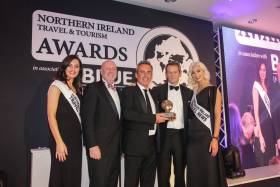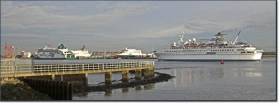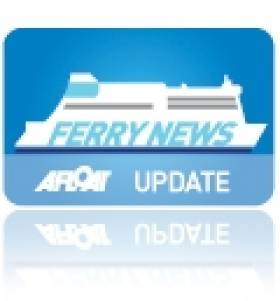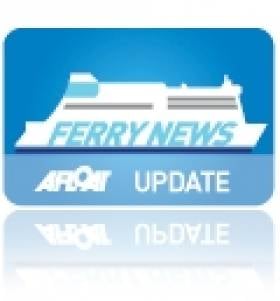Displaying items by tag: Best Ferry Company
Irish Media Vote Stena Line Best Ferry Company
At the 2019 Travel Media Awards, travel writers, bloggers and influencers from all over Ireland have voted Stena Line Best Ferry Company for the seventh year in succession.
More than 200 guests gathered at the Travel Media Awards event which was held in the Shelbourne Hotel, Dublin. They are the only awards that call on members of the media to vote for their favourite travel companies.
Now in their ninth year, the awards comprise of 26 categories which are voted for by a wide cross section of media in Ireland, independently audited and managed by Technological University Dublin (TUD).
Diane Poole OBE, Stena Line’s Travel Commercial Manager, Irish Sea South, was thrilled to pick up the award on behalf of Ireland’s market leading ferry company.
“This award is very special to us as it is voted for by travel media across Ireland, who play such an important role in communicating what the travel industry has to offer Irish holidaymakers,” said Diane.
“To know that media have travelled with us, sampled our service and hold us in such high regard is very pleasing and this award is a fantastic independent endorsement of the Stena Line product, the quality of our service and our facilities on-board.
“I’d like to take this opportunity to thank all of the journalists, bloggers and influencers who voted for us – and also pay tribute to our amazing employees who go the extra mile every day to make sure that our customers have the best possible travel experience.
“At Stena Line, we never stand still and are always looking at ways to improve our service for travel and freight customers – which is reflected by continued investment in our routes and fleet. In this respect, we’re all looking forward to welcoming three new E-Flexer ships on our Irish Sea routes over the next couple of years, starting with the Stena Estrid which is on schedule to enter service on our Dublin to Holyhead route in early 2020,” concluded Diane.
The three new E-Flexer vessels, currently under construction in China, represent a significant multi-million pound investment by Stena Line in the Irish Sea region.
The Stena Estrid will be first to arrive on the Dublin to Holyhead route early next year, followed by the Stena Edda on the Belfast to Liverpool route in spring 2020. The third ship will also be introduced on the Belfast to Liverpool route in 2021.
All three vessels will be larger than today’s standard RoPax vessels at 215 meters long with a freight capacity of 3,100 lane meters and the space to carry 120 cars and 1,000 passengers.
The company is the largest ferry operator on the Irish Sea, with routes as mentioned above between Ireland and Britain and also Belfast to Heysham, Belfast to Cairnryan and Rosslare to Fishguard.
In addition they are the only operator to offer a direct service from Rosslare to Cherbourg with three return crossings a week on the Ireland-France route.
‘Best Ferry Company’ As Stena Line Win for 25th Time
#ferryaward - After winning a top ferry company award, Stena Line celebrated a record-breaking 25th time at the annual Northern Ireland Travel and Tourism Awards.
The ‘Best Ferry Company’ award was presented to Paul Grant, Stena Line’s Trade Director, Irish Sea North (ISN) at the awards ceremony last Friday at the Slieve Donard Resort and Spa in Newcastle, Co Down.
Northern Ireland Travel News has organised these prestigious awards for the past 26 years and this year’s ceremony was hosted by BBC's Pointless presenter Alexander Armstrong. The ceremony was attended by more than 430 guests and travel industry VIPs from all over the UK and Ireland.
Almost 30 awards were presented on the night, decided by votes from the travelling public, the travel trade, and by travel and tourism industry leaders.
Orla Noonan, Stena Line’s Travel Commercial Manager (ISN) said: “It’s an honour for Stena Line to receive this prestigious award coming as it does from our peers across the travel industry.
“Although this is our 25th consecutive year of winning the award we take absolutely nothing for granted and realise that each year we have to work even harder to provide our customers with a service which really is ‘award winning’.
“Whilst the travel industry is constantly changing and reinventing itself in an increasingly digital world, putting the needs of the customer first, every time, still remains the key objective for our business success, “added Orla.
Stena Line is the largest ferry operator on the Irish Sea, offering the biggest fleet and the widest choice of routes between Ireland to Britain including Belfast to Liverpool and Heysham, Belfast to Cairnryan, Dublin to Holyhead and Rosslare to Fishguard routes, a total of 228 weekly sailing options between Ireland and Britain.
In addition the ferry operator has a direct service from Rosslare to Cherbourg with three return crossings a week. Approximately three million passengers each year are carried on its Irish Sea routes, more than its rival ferry operators combined.
#TravelAwards – At the Irish Travel Industry Awards held recently in Dublin, the winners in the Ferry and Cruise categories were presented in the historic surroundings of the Mansion House.
The annual awards are an initiative of the Irish Travel Agents Association (ITAA) with the support of Worldchoice and Travelsavers. The awards are the premier awards for suppliers and travel agents in Ireland.
Below are listed the winners from the Ferry & Cruise categories:
Best Ferry Company: Irish Ferries
Best General Cruise Company: Royal Caribbean International
Best Ultra Luxury Cruise Company: Silversea Cruises
Best Specialist Cruise Company: Uniworld River Cruises
Travel Trade Award ‘Best Ferry Company’ to Irish Ferries
#FerryAward – At the Irish Travel Trade Awards, now in its 23rd year, Irish Ferries was voted 'Ireland's Best Ferry Company 2014' during a ceremony held last week.
The award category saw the ferry company winning in the face of competition from operators not just on Ireland – UK routes but those also serving on Ireland – France services.
Organised and sponsored by the Irish Travel Trade News magazine, the ITTN awards saw the ferry operator win the acclaimed award for the eighth year in succession and the 17th time overall. Each of the award categories are based on independent votes of travel trade professionals working in agencies throughout the island of Ireland.
The ferry award is said to have reflected the travel industry's response to the continuing investment being made by Irish Ferries.
In the past year, this has been seen particularly in the introduction of the passenger and freight ferry or 'ro-pax', Epsilon which has boosted capacity on the Dublin – Holyhead route and a new once-weekly return service on the new Dublin – Cherbourg route.
Irish Ferries Win Best Ferry Company
#FERRY NEWS- Irish Ferries has won the 'Best Ferry Company' award at the Irish Travel Agents Association travel industry awards held last night in the Mansion House, Dublin.
This was the thirteenth time that the award has gone to Irish Ferries since the event started two decades ago. The award which was presented on foot of votes cast by travel agents and their staff employed throughout the island of Ireland was accepted jointly by its head of passenger sales Declan Mescall and passenger sales manager Marie McCarthy.
Thanking travel agents for the honour their decision bestows on the company, Mr. Mescall said that the Best Ferry award reflects the high standard of service which passengers can now expect from Irish Ferries.
'In addition, it recognises the numerous developments that have taken place in the company in recent times, including the introduction of class leading advances in electronic communications, the most recent being the introduction of the industry's first bookable smart phone app which was launched just months ago' said Mr. Mescall.
The award follows Irish Ferries parent company Irish Continental Group (ICG) whose Dutch based container division Eucon Shipping and Transport was awarded Short Sea Shipping Company of the Year Award 2011, sponsored by the Irish Maritime Development Office (IMDO).
Eucon operate regular feeder services to Antwerp, Rotterdam and Southampton from the ports of Belfast, Dublin and Cork.



























































